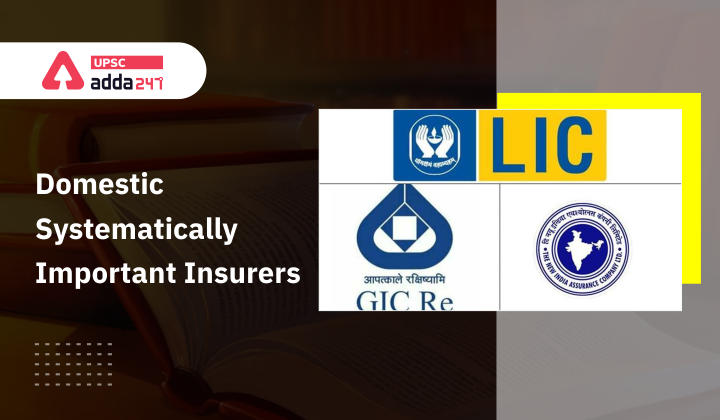Table of Contents
D-SIIs: Relevance
- GS 3: Indian Economy and issues relating to planning, mobilization, of resources, growth, development and employment.
Context
- IRDAI (Insurance Regulatory and Development Authority of India) has recently said that LIC, GIC Re and New India has been retained as Domestic Systemically Important Insurers (D-SIIs) for 2021-22.
What is D-SII?
- Domestic Systemically Important Insurers (D-SIIs) refer to insurers of such size, market importance and domestic and global inter connectedness whose distress or failure would cause a significant dislocation in the domestic financial system.
- Therefore, the continued functioning of D-SIIs is critical for the uninterrupted availability of insurance services to the national economy.
D-SIIs: Too Big to Fail
- D-SIIs are perceived as insurers that are ‘too big or too important to fail’ (TBTF).
- This perception and the perceived expectation of government support may amplify risk taking, reduce market discipline, create competitive distortions, and increase the possibility of distress in future.
- These considerations require that D-SIIs should be subjected to additional regulatory measures to deal with the systemic risks and moral hazard issues.
- D-SIIs will also be subjected to enhanced regulatory supervision.
D-SIIs responsibilities
- Given the nature of their operations and the systemic importance of the D-SIIs, these insurers have been asked to carry out the following:
- Raise the level of corporate governance;
- identify all relevant risk and promote a sound risk management culture.
D-SIIs parameters
- The Insurance Regulatory and Development Authority of India (IRDAI) has developed a methodology for identification and supervision of D-SIIs. The parameters include:
- the size of operations in terms of total revenue
- global activities across more than one jurisdiction;
- lack of substitutability of their products and/or operations; and
- interconnectedness through counterparty exposure and macro-economic exposure.
About IRDAI
- Insurance Regulatory and Development Authority of India (IRDAI), is a statutory body formed under an Act of Parliament, i.e., Insurance Regulatory and Development Authority Act, 1999 (IRDAI Act 1999) for overall supervision and development of the Insurance sector in India.
- It has been set up under Ministry of Finance.
IRDAI composition
- The Authority is a ten-member team consisting of
- a chairman;
- five whole-time members;
- four part-time members,
- Where all the members are appointed by the Government of India.
IRDAI missions
- To protect the interest of and secure fair treatment to policyholders;
- To bring about speedy and orderly growth of the Insurance industry, for the benefit of the common man, and to provide long term funds for accelerating growth of the economy;
- To set, promote, monitor and enforce high standards of integrity, financial soundness, fair dealing and competence of those it regulates;
- To ensure speedy settlement of genuine claims, to prevent Insurance frauds and other malpractices and put in place effective grievance redressal machinery;
- To promote fairness, transparency and orderly conduct in financial markets dealing with Insurance and build a reliable management information system to enforce high standards of financial soundness amongst market players;
- To take action where such standards are inadequate or ineffectively enforced;
- To bring about optimum amount of self-regulation in day-to-day working of the industry consistent with the requirements of prudential regulation.
Also Read:





 TSPSC Group 1 Question Paper 2024, Downl...
TSPSC Group 1 Question Paper 2024, Downl...
 TSPSC Group 1 Answer key 2024 Out, Downl...
TSPSC Group 1 Answer key 2024 Out, Downl...
 UPSC Prelims 2024 Question Paper, Downlo...
UPSC Prelims 2024 Question Paper, Downlo...




